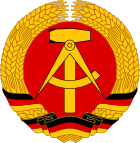The Polish People's Party (Polish: Polskie Stronnictwo Ludowe, abbreviated to PSL, often shortened to ludowcy is an agrarian and Christian democratic political party in Poland. It has 14 members of the Sejm and four Members of the European Parliament. It was the junior partner in a coalition with Civic Platform. It is a member of the European People's Party and the European People's Party group in the European Parliament.

The Volkskammer was the unicameral legislature of the German Democratic Republic.
The Our Ukraine–People's Self-Defense Bloc was an electoral alliance active in Ukraine from 2001 until 2012, associated with former President Viktor Yushchenko. Since 2005, the bloc had been dominated by a core consisting of the People's Union "Our Ukraine" party and five smaller partner parties. On 17 November 2011, the Ukrainian Parliament approved an election law that banned the participation of blocs of political parties in parliamentary elections. Since then several members of the Bloc have since merged with other parties.

Elections in Ukraine are held to choose the President, Verkhovna Rada, and local governments. Referendums may be held on special occasions. Ukraine has a multi-party system, with numerous parties in which often not a single party has a chance of gaining power alone, and parties must work with each other to form coalition governments.

The Portuguese legislative election of 1991 took place on 6 October. The Social Democratic Party, under the lead of Cavaco Silva, won a historic third term and won with an absolute majority for the second consecutive turn, achieving a higher share than in the previous election, losing, however, 13 MPs due to the reduction of the overall number from the original 250 to 230. Cavaco Silva became the first Prime Minister since Hintze Ribeiro, in 1904, to lead a party into three successive democratic election victories.

Federal elections were held in Germany on 18 September 2005 to elect the members of the 16th Bundestag. This became necessary after a motion of confidence in Chancellor Gerhard Schröder failed on 1 July. Following the defeat of Schröder's Social Democratic Party (SPD) in a state election, Schröder asked his supporters to abstain from the Bundestag motion, knowing the motion would fail and thus triggering an early federal election.
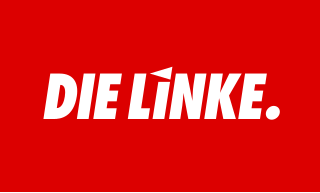
The Left, also commonly referred to as the Left Party, is a democratic socialist political party in Germany. It is considered to be left-wing populist by some researchers. The party was founded in 2007 as the result of the merger of the Party of Democratic Socialism (PDS) and the Electoral Alternative for Labour and Social Justice (WASG). Through the PDS, the party is the direct descendant of the ruling party of the former East Germany (GDR), the Socialist Unity Party of Germany (SED).
Parliamentary elections were held in Poland on 16 April 1961. They were the third elections to the Sejm, the parliament of the People's Republic of Poland, and fourth in Communist Poland. They took place on 15 April.
Parliamentary elections were held in Poland on 26 October 1952. They were the first elections to the Sejm, the parliament of the People's Republic of Poland. They were also the first under undisguised Communist rule; the government had dropped all pretense of being a coalition after the fraudulent 1947 election. The official rules for the elections were outlined in the new Constitution of the People's Republic of Poland and lesser acts.
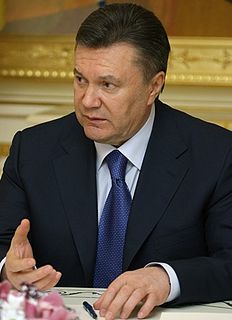
Early parliamentary elections in Ukraine took place on 30 September 2007. The date of the election was determined following agreement between the President Viktor Yushchenko, the Prime Minister Viktor Yanukovych and the Chairman of the Verkhovna Rada Oleksandr Moroz on 27 May 2007, in an attempt to resolve the political crisis in Ukraine triggered by the 2 April 2007 presidential decree on dissolution of Ukraine's parliament.
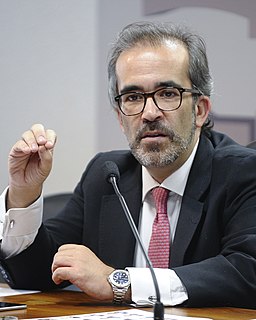
The European Parliament election of 2009 in Portugal was the election of the delegation from Portugal to the European Parliament held on 7 June 2009.
A bloc party in politics may refer to a political party that is a constituent member of an electoral bloc. However, this term also has a more specific meaning, referring to non-ruling but legal political parties in an authoritarian or totalitarian regime as auxiliary parties and members of a ruling coalition, differing such governments from a pure one-party state, although such parties are not considered opposition parties or alternative sources of power.

Legislative elections were held in the German Democratic Republic on 17 October 1954. There were 466 deputies to the Volkskammer in total. All were candidates of the single-list National Front, dominated by the Communist Socialist Unity Party of Germany. The list received the approval of 99.46% of voters, with turnout reported to be 98.5%.

Parliamentary elections were held in the German Democratic Republic on 19 October 1950. They were the first held since the founding of the country on 7 October 1949. There were 466 deputies to the Volkskammer in total.
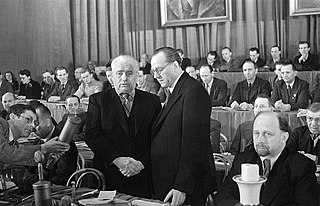
The merger of the Communist Party of Germanyand the Social Democratic Party of Germanyinto the Socialist Unity Party of Germany occurred on 21 April 1946 in the territory of the Soviet occupation zone: it is also called the forced merger of the KPD and SPD. In the course of the merger, about 5,000 Social Democrats who opposed it were detained and sent to camps and jails.
Democratic centralism is a democratic practice in which political decisions reached by voting processes are binding upon all members of the party.

The People's Democratic Front was a political alliance in Romania during the communist era, dominated by the Romanian Communist Party (PCR).
